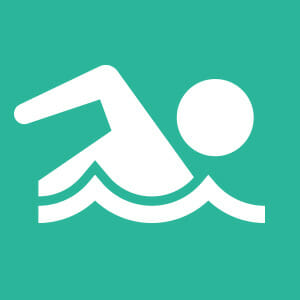
Swimming is a great activity and something your whole family can enjoy. It also comes with risks, and water safety should be a concern for you and your family. According to the Center for Disease Control (CDC), drowning is the second leading cause of unintentional injury death for children from ages 1-14, and the fifth leading cause for people of all ages.
Water competency is a way of improving water safety for yourself and those around you through avoiding common dangers. It means being able to anticipate, avoid, and survive common drowning situations, as well as being able to recognize and provide assistance to those who are in need. Water competency includes water safety awareness and basic swimming skills – not just in swimming pools, but in oceans, rivers, and lakes.
Here are the top water safety tips and precautions.
- Wear a United States Coast Guard approved life jacket.
- Teach children water safety and swimming skills as early as possible. Enroll them in swimming classes.
- Never leave children unsupervised, even for a split second. Maintain constant visual contact with children near a body of water. Make sure that there is a responsible, designated person to watch the water when children are swimming.
- Swim sober. Alcohol and drugs impair your judgment, balance, coordination, and your body’s ability to stay warm.
- Swim only in safe areas, especially if you’re in a lake or river. They are usually marked by ropes or buoys and are more likely to be free of weeds and other dangers.
- Don’t swim in polluted water. Pay attention to warning signs. If you’re not sure, it’s best not to get in.
- Know your limits. Cold water, currents, and other dangerous conditions can challenge the strongest swimmers.
- Test the water temperature before going in. Jumping into cold water can shock your body, slow your muscles, and elevate your heart rate and blood pressure, which makes it more difficult for you to swim.
- Never swim alone. Make sure you have someone with you, preferably a lifeguard.
- Enter the water feet-first. Serious injuries can result from diving headfirst into the water.
- Follow posted safety signs. These usually advise against running, pushing, or diving.
- Drink plenty of water. It’s easy to get dehydrated in the sun, especially if you’re active and sweating. Dizziness, feeling lightheaded, and nausea can be signs of dehydration and overheating, so if you’re feeling sick, get out of the water immediately and let someone know.
- Know how and when to call for help. Have a cell phone handy. Regardless of where you are, the ability to call 911 in an emergency can be a lifesaver.
- Make sure that you have a first aid kit on standby.
Water safety can help prevent serious injuries or drowning. Be safer near large bodies of water by enrolling in swim classes and learning about water competency. Knowledge is key when it comes to water and pool safety. It only takes a moment. Playing in the water can be fun, but it can also be dangerous. Learn how to stay safe.
Written by Dami Falade



